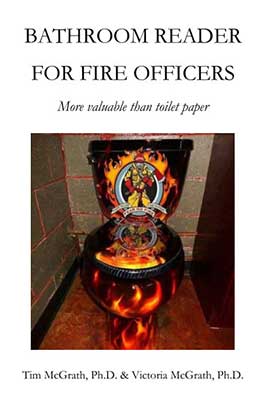Résumé Myths
by Dr. Victoria McGrath & Dr. Tim McGrath

Most Chiefs as some point in their career will give serious consideration to updating their résumé. Hopefully, it will be on their schedule not their employers. Perhaps the myth that is most dangerous is the belief that as a Wisconsin Fire Chief you are not subject to the world of - at will employment - therefore, you are immune from being terminated. True you are not an 'at will employee' but you are not untouchable and the cost of fighting to remain in a position in which your governing officials do not want you can be very high and personal.
The first question you should ask yourself is "do I qualify for the current position I hold?" If you were applying for your current position do you have the professional qualifications and expertise to be appointed as Fire Chief of your community?
It is reasonable to evaluate that question and update your résumé, especially when one never knows when opportunity is going to knock. The following is a culmination of our 20 years of reviewing résumés.
Myth #1: Résumés Must Be On A Single Page
Myth is incorrect - that myth went out in the early 90's; especially after human resource personnel needed magnifying glasses to read résumés that were typed with 8-pitch type and no margins trying to capture all the information the author wanted to convey. On the flip side, one must also be concerned with the length of the résumé (our record is from a Fire Chief candidate who submitted 48 pages). Use the amount of paper necessary to adequately address your skills and qualifications. A typical résumé is about 3 pages in length.
Myth #2: Police Chiefs Make More Money Than Fire Chiefs
Myth is correct - the reason? Education. The law enforcement profession determined years ago that a bachelor's degree at minimum was necessary to administer their organization. However, the fire/EMS profession is just coming to that realization. In many situations - education and compensation have a link. It is time for the fire/EMS profession to realize that a college degree is an expectation by most hiring authorities - not just a preference. In fact, most Police Chief position's now require a master's degree and our clients are requiring a bachelor's degree for Fire Chief candidates.
Myth #3: Education In Fire Science Is What Is Really Needed
Myth predominately incorrect - Most hiring officials assume someone who has been in the fire service for years knows how to extinguish a fire. They can easily determine that by inquiry of past employers; however, their expectations are that a Fire Chief is no longer just a tactician - rather he or she is a businessperson, a politician, an advocate, and a leader. Thus, education should be related to business - either a bachelors in business administration or public administration. The days of the white helmet being on the nozzle are gone in most departments.
Myth #4: Keep Abreast of Events And Issues In The Fire Service
Myth is correct - but to a point! In other words, it is great to keep up with the myriad of certifications and licenses necessary to run a fire department; however, you do not need to list every continuing education, license, certification, or class you have ever attended in your entire career. Don't laugh - we've gotten résumés with a minimum of 5 pages of course listings dating back to when the individual took a first aid class in high school. List those that are pertinent to the position. If you trying to find a fire chief position - your skills in weapons of mass destruction may be nice, but perhaps those that are hiring are more interested in your leadership style, budgetary experience, and management accomplishments. Show your education and experience in budgets, personnel, union relations, policy and procedure development, mentoring and coaching employees. Those are the skills necessary to effectively lead today's fire/EMS department whether volunteer, paid-on-call, career or combination.
Myth #5: You Don't Need To Think Like An Elected Official Or Administrator
Myth is terribly wrong - your job is to become an advocate for the community in terms of the fire/EMS service. Thus, you need to think like an administrator. They don't think in terms of fires and rescue calls - but in terms of dollars and meeting citizens' expectations all within the terms of the budget. Often departments within municipalities forget they are part of a bigger entity all-vying for the same tax dollars. Successful fire chiefs think like a businessperson and put in context their needs in terms an administrator or elected official can understand. Saying that if you don't get funding the community will have dead bodies in the streets, or your ISO rating will skyrocket so high citizens will have to move because of the cost of their home insurance, seldom wins the financial or logical argument.
Myth #6: List All of Your Job Responsibilities On Your Résumé
Myth is incorrect - most hiring authorities have a general idea of what a fire chief does; however, what they want to know is what YOU DID! Take the major responsibility categories - typically found in the ad and break it down into accomplishments you have achieved. Obviously you need to be truthful - but tailor your résumé to the skills and qualifications that demonstrate your ability to do the job. Anyone can list 'prepare the budget'; but stating, 'prepared and maintained within municipal guidelines a $1.2 M dollar general budget' says a lot more.
Myth #7: Baffle Them With Jargon
Myth is incorrect - Remember who your audience is. In most cases it is an appointed police and fire commission made up of individuals with little to no fire/EMS experience. If they can't understand what you've accomplished - don't expect an interview. Keep in mind that the typical initial review of a résumé takes 3 seconds. If you can't get your message across in that brief amount of time - it will probably end up on pile number three!
Myth #8: Include Action Pictures
Myth is incorrect - but yes it has occurred. The 48-page résumé mentioned included a number of pictures with the individual standing in front of a burning building. We showed this résumé picture to ten non-fire/EMS hiring professionals and each asked the same question "why the heck isn't he putting it out"?
If when you read your own résumé and you are unsure as to whose it is - that should be a clue to rewrite. Be honest - it is true you will never look as good as you do in your own résumé but embellishing can easily be interpreted as untruths. Keep it succinct - highlight your accomplishments - tailor each résumé to the position - and make it readable. These tips should increase the effectiveness of your résumé and help land you an interview. The rest is up to you! (By the way the pictures were even in color and it didn't help).





